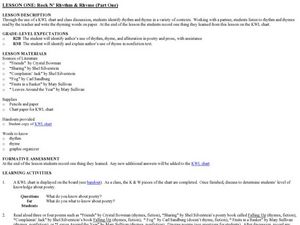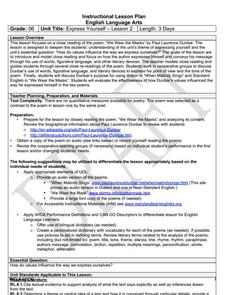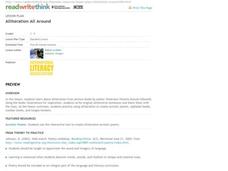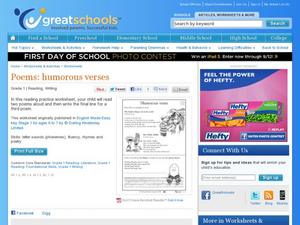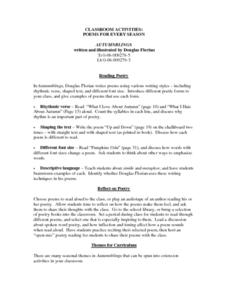Teacher's Corner
Limerick
Young poets try their hand at one of the most popular fixed poetry forms, the limerick. The eighth in a series of ten poetry writing exercises.
Curated OER
Literary Terms
Seriously, 93 slides of literary terms? Yes, and well worth the time, although perhaps not all at once. The beauty here is in the concise, easy-to-understand definitions for such well-known terms as imagery and personification, as well...
Curated OER
Poetry: Developing a Taste
Students identify nouns in poems. In this poems lesson plan, students read poems, discuss them, analyze them, learn the rhythm, and ultimately define nouns that they discover in their poems.
National Endowment for the Humanities
The Impact of a Poem's Line Breaks: Enjambment and Gwendolyn Brooks' "We Real Cool"
High schoolers analyze the Gwendolyn Brooks use of enjambment in her poem "We Real Cool." For this poetry analysis activity, students define common poetic devices and the examples of enjambment in the poem. High schoolers discuss the...
ReadWriteThink
Sonic Patterns: Exploring Poetic Techniques Through Close Reading
Robert Hayden's poem "Those Winter Sundays" serves as the anchor text in a five-part lesson that takes the mystery out of poetry analysis by modeling explicit strategies for pupils to employ to conduct a close reading of a poem. After...
Curated OER
Lesson Two: Rock N Rhythm & Rhyme (Part Two)
Second graders find rhythm and rhyme in poetry. In this poetry lesson, 2nd graders listen to different poems to find the rhyming words. They play a memory game and try to find two words that rhyme.
Curated OER
Lesson One: Rock N Rhythm & Rhyme (Part One)
Second graders listen to poetry to find rhyme and rhythm. In this poetry lesson, 2nd graders listen to different types of poetry and find how they are alike. They look for rhyming words and create their own rhymes.
Curated OER
Kinder Poems & Songs
Students complete a year-long unit for poetry and songs. In this poetry and songs lesson, students complete nine lessons for animal songs and animal poetry to improve their understanding of rhyme, rhythm, and poetry.
Curated OER
Rhythm and Rhyming Long Rope Jumping
Students discuss the importance of rhythm in rope jumping. They practice turning, then jumping. Students discuss the various types of rhymes. They work in groups for a couple of classes, students rotate from chart to chart trying out...
Curated OER
Poetic Elements
Poetry is all about sound and rhythm. The sound of the words, the rhythm of the lines, and the emotional atmosphere created by these elements and the literary devices poets use, compress whole stories into a few stanzas. The specialized...
Curated OER
Poetry In Motion
Explore poetry with your class by having them film themselves reading different types of poems. They explore different elements in all types of poetry. They choose images to accompany their poems and learn to create video presentations...
Curated OER
Asian Rhythms
Students experience another culture through a unit that explores instruments, spoken language, and calligraphy. Students experience the Asian culture first hand through a Taiko Drum Concert, as well as lunch at an Asian Buffet &...
Curated OER
6th Grade: Express Yourself, Lesson 2: Close Read
The second instructional activity of a pair about Paul Laurence Dunbar, this plan focuses in particular on his poem, "We Wear the Masks." After a short historical introduction, class members conduct a series or readings, marking up the...
ReadWriteThink
Alliteration All Around
Discover alliteration found in picture books by Pamela Duncan Edwards. Then, dive into a read aloud of Alligators All Around by Maurice Sendak. This practice sets the stage for budding poets to create their own acrostic poem, write an...
Curated OER
Poems: Humourous Verses
First grade is a great time to build strong reading skills. Here are three short rhyming poems or common nursery rhymes that are intended to help boost reading fluency. Because most children know these rhymes, they will have an easier...
Curated OER
Clerihew Dances III, 4 and 5
Third graders relate dance movements to chants. They tap out the rhythm of poetry on different body parts.
Curated OER
Clerihew Dances II
Third graders explore rhythm and quality of word and phrased to that of dance. They move to the rhythm of poetry.
National Endowment for the Humanities
Robert Frost's "Mending Wall": A Marriage of Poetic Form and Content
High schoolers examine the relationship between a poem's form and its content in Robert Frost's poem, 'Mending Wall.' They read and analyze the poem, explore websites, listen to an audio clip of Frost reading the poem, and write an...
Curated OER
The Poetics of Hip Hop
The Bard, Nikki Giovanni, Mos Def? “Sonnet 18,” Ego Tripping,” and “Black on Both Sides”? Sure! It’s the poetics. Class members compare the lyrics, rhythm, and rhyme in classic poetry to hip-hop in a richly detailed resource that...
Curated OER
Poetry: Using Prosodic Devices
Students examine poetry examples in free verse focusing on their prosodic elements. After critiquing works by several authors, they write their own poems utilizing such devices as alliteration, repetition, rhyme, and stanzas.
Curated OER
Poems for Every Season
Young scholars read and explore autumn poetry. In this poetry lesson, students read Autumnblings and are introduced to different poetic forms. Lesson includes ideas for exploring the poetic forms presented in the book and...
Curated OER
Splish, Splash Poetry
Students write weather shape poems and sing weather related songs. In this creative writing instructional activity, students read the book, It's Raining, It's Pouring and list weather words they heard in the story. Students use the...
Curated OER
Poetry Power
Second graders explore language arts by analyzing poems in their class. In this word play lesson, 2nd graders define the terms rhyme, rhythm and alliteration and identify their uses. Students utilize class word lists to write their own...
Curated OER
Create a Poem
Students write three simple rhyming poems and read them aloud with rhythm. Students select two adjectives that are opposites and two rhyming verbs to create rhyming lines of the same length with an adjective-noun-verb pattern.








